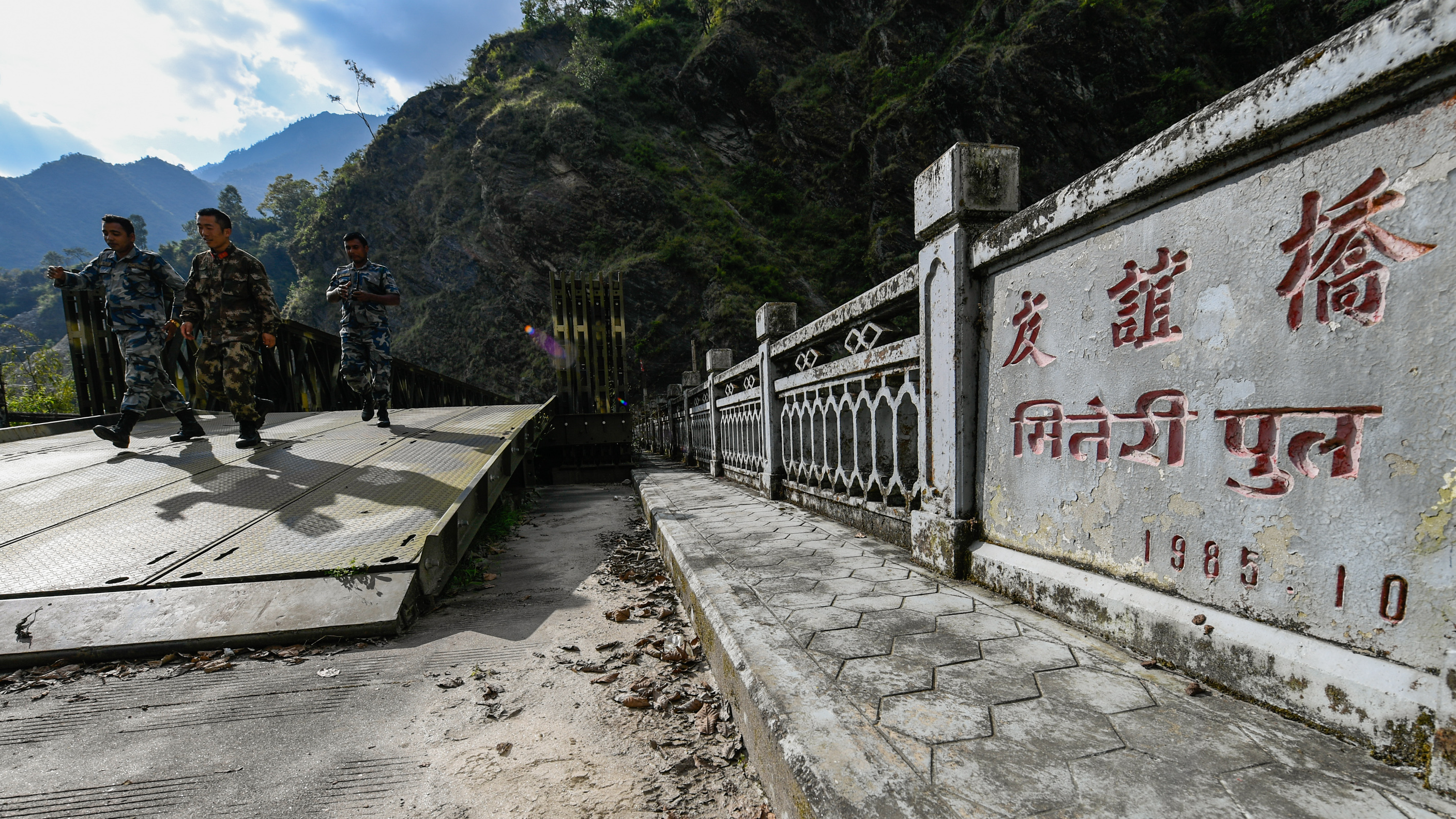
Chinese and Nepalese officers walk across the China-Nepal Friendship Bridge at Zham Pass, southwest China's Tibet Autonomous Region, October 29, 2017. /Xinhua
Chinese and Nepalese officers walk across the China-Nepal Friendship Bridge at Zham Pass, southwest China's Tibet Autonomous Region, October 29, 2017. /Xinhua
Editor's note: Dr. Prakash Chandra Lohani is a former Foreign and Finance Minister of Nepal, taught finance at California State University, Northridge, and is Chairman Emeritus at South Asian Institute of Management. Sumesh Shiwakoty is a policy analyst and commentator, has worked with the World Policy Institute in New York, received a research grant from the Andrew W. Mellon Foundation, and has written analysis for publications including The National Interest, The Diplomat, and The Times of India. The article reflects the author's opinions and not necessarily the views of CGTN.
At a time when tensions between Beijing, New Delhi and Washington still need to be further alleviated, Nepal can fill the gap and play a role.
On a recent visit to Kathmandu, Chinese State Councilor and Defense Minister Wei Fenghe reaffirmed China's commitment to safeguarding Nepal's national independence, sovereignty and territorial integrity.
However, Beijing also seems anxious about threats to its national security arising from Nepalese soil, such as occurred in the 1960s when Khampa militants raided Tibet from Nepali territory. China is also concerned about U.S. efforts to bring Nepal into its orbit. As an example, then U.S. Secretary of State Mike Pompeo tried in a 2018 meeting with the Nepalese Foreign Minister to recruit Nepal to support the U.S. effort to contain China by asking Nepal to play a "central role" in the "Free and Open Indo-Pacific" (FOIP) strategy.
A recent prematurely declassified FOIP document now shows FOIP's topmost strategic goal was to counterbalance China through various actions, including deterring China from using military force against the U.S. or its allies, maintaining "an intelligence advantage over China," and perpetuating "American industries' innovation edge via-a-vis China."
It is in both China's and Nepal's best long-term interests for Nepal to continue to maintain its longstanding strict policy of non-alliance and non-interference. Nepal has demonstrated its commitment to this policy by walking away from the FOIP in 2018, stating that "Nepal does not believe in any strategic alliances." For that same reason, the Nepal army conducted operations to disarm and defeat Khampa militants in the 1960s, not to take sides in the conflict but to prevent Nepalese soil from being used to violate China's sovereignty.

Tourists walk past the Chinese information desk after their arrival at Tribhuvan International Airport in Kathmandu, Nepal, February 1, 2019. /Xinhua
Tourists walk past the Chinese information desk after their arrival at Tribhuvan International Airport in Kathmandu, Nepal, February 1, 2019. /Xinhua
Still today, there is strong public opinion in Nepal for non-alliance and pacifism. Nepal, as the birthplace of Lord Gautama Buddha, embodies the Buddhist doctrine of peace and non-violence. Spirituality guides the lives of many Nepalis, a majority of whom believe that Nepal should be a voice for peace and justice in the world. The fact that most of its people take pride in Nepal being the fifth-largest peacekeeping force in the United Nations shows how strong public support in Nepal is for pacifism. It seems inconceivable that the Nepalese people would ever approve of joining any military alliance that would be counterproductive to either of their neighbor's national security.
Many hardliners who embrace the outdated balance-of-power model of global affairs would like to see ongoing tension between Beijing, Washington, and New Delhi. However, anyone who is aware of how interconnected the current world knows that any large-scale conflict between major powers will be a lose-lose proposition for all involved. The major powers have much to lose. Despite all the trade wars between the U.S. and China, trade between these two powers exceeded $558.1 billion in 2019. China still holds the largest portion of U.S. Treasury securities while the U.S. government in recent years has acknowledged the interdependence of the two nations, saying that "global supply chains involving China and the U.S. are complex." And despite all the bloody conflicts on the Indian-Chinese border, China was India's largest trading partner in 2020, while India remains the biggest borrower from the China-led Asian Infrastructure Investment Bank.
Moving forward, keeping hardliners at bay, de-escalating conflicts, and promoting dialogue with the major powers should remain China's top strategic goals. As a founding member of a non-aligned movement that sits between India and China, Nepal can play the role of mediator in the future to de-escalate any tensions in the region, a role similar to that played by neutral European states like Finland and Sweden at the height of the Cold War. Finland and Sweden took the initiative to bring both NATO and the Soviet Union together for the Conference on Security and Cooperation in Europe and to negotiate Confidence and Security-Building Measures, which many scholars argue reduced the risk of war.
Similarly, to secure sustainable peace and security in our time, states like Nepal, which are politically neutral and geographically relevant, can promote dialogue between China and other major powers and de-escalate potential conflicts. China's foreign policy goal towards Nepal should be to help Nepal claim this role as a global negotiator in the future while supporting Nepal's desire to maintain its current policies of neutrality and non-alignment.
(If you want to contribute and have specific expertise, please contact us at opinions@cgtn.com.)

